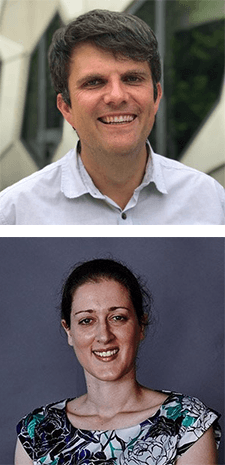

The Council of the Royal Society of NSW extends its warmest congratulations to two of its Fellows who have received awards from the Royal Australian Chemical Institute Medicinal Chemistry and Chemical Biology Division in May 2022.
Dr Tristan Reekie FRSN, of UNSW Canberra, and Professor Elizabeth New FRSN, of the University of Sydney, have been jointly received the Peter Andrews Award for Innovation in Medicinal Chemistry and Chemical Biology. The award recognises innovation in the development of small molecules as potential therapeutic agents or chemical probes by RACI members who are within 15 years of being awarded their PhD.
Dr Tristan Reekie completed his PhD in 2013 at ANU under the supervision of Professor Martin Banwell. He then completed a postdoctoral position at ETH Zurich with Professor François Diederich before returning to Australia to work with Professor Michael Kassiou at the University of Sydney. He began his independent career at ANU, which he has continued at the University of New South Wales Canberra where he is currently based.
His research is focused on small molecule organic chemistry with application to materials, plant science, and medicinal chemistry. It is the latter area where he has made the biggest impact, generating new compounds to treat substance use disorders and social disfunction. The success of this research has led to the establishment of a spin-out company, Kinoxis Therapeutics, where Tristan continues to work as their Head of Chemistry alongside his academic role. Tristan leads several of the company’s research programs, helping to advance multiple drug candidates towards first-in-human clinical trials. In addition to his innovation in research, Tristan is heavily involved in teaching and outreach to enhance interest in science amongst students and the general public. In particular, Tristan has had long-term involvement with programs such as the Australian Chemistry Olympiad and was the recipient of a Tall Poppy Award in 2020 for promoting science among students, teachers and an appreciation of science in the broader community.
Professor Elizabeth New, a graduate of the University of Sydney, completed her PhD at Durham University before undertaking postdoctoral studies at the University of California at Berkeley, and as an ARC DECRA Fellow at the University of Sydney, following which she joined the academic staff of the School of Chemistry in 2015. During her career, she received numerous awards, amongst which are the Malcolm Macintosh Prize for Physical Scientist of the year in 2019 and the ‘3M Emerging Leader’ Australian Museum Eureka Prize in 2018.
.Her research has led to the development of different types of fluorescent sensors which make possible, at the molecular level, the observation of how cells cycle and change through events and over time. While existing imaging systems such as ultrasound and MRI provide valuable structural information, they are unable to characterise the nature and distribution of chemicals within the cell. It is here that the fluorescent sensors developed by Professor New make possible the observation of complex chemical processes within cells, enabling an understanding of how cells cycle through oxidative events over long periods, and in turn opening up potential breakthrough treatments for diseases associated with ageing (e.g., cardiovascular, cancer, and diabetes) that afflict 50% of Australians and which are responsible for 85% of deaths.